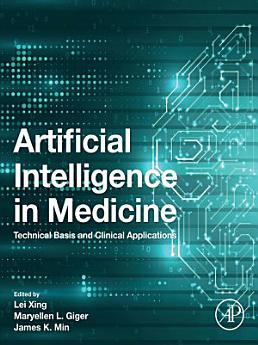Artificial Intelligence in Medicine: Technical Basis and Clinical Applications
About this ebook
About the author
Dr. Lei Xing is currently the Jacob Haimson Professor of Medical Physics and Director of Medical Physics Division of Radiation Oncology Department at Stanford University. He also holds affiliate faculty positions in Department of Electrical Engineering, Bio-X and Molecular Imaging Program at Stanford. Dr. Xing’s research has been focused on artificial intelligence in medicine, medical imaging, treatment planning, molecular imaging instrumentations, image guided interventions, and nanomedicine. He has made unique and significant contributions to each of the above areas. Dr. Xing is an author on more than 400 peer reviewed publications, a co-inventor on many issued and pending patents, and a principal investigator on numerous NIH, ACS, DOD, AAPM, RSNA and corporate grants. He is a fellow of AAPM (American Association of Physicists in Medicine) and AIMBE (American Institute for Medical and Biological Engineering). He has received numerous awards from various societies and organizations for his work in artificial intelligence, medical physics and medical imaging.
Dr. Maryellen L. Giger is the A.N. Pritzker Professor of Radiology, the Committee on Medical Physics, and the College at the University of Chicago. She also serves as Vice-Chair in the Department of Radiology for Basic Science Research. Dr. Giger is one of the pioneers in the field of CAD (computer-aided diagnosis) and her artificial intelligence research in cancer imaging for risk assessment, diagnosis, prognosis, and therapeutic response has yielded various translated components, including the use of these “virtual biopsies in imaging-genomics association studies. She is a recipient of multiple NIH, DOD, and other grants, has authored more than 240 peer-reviewed journal papers, and is inventor on 30 patents. Dr. Giger is a member of the National Academy of Engineering (NAE) of the National Academies; Fellow of AAPM, AIMBE, SPIE, SBMR, IEEE, and IAMBE; recipient of the William D. Coolidge Gold Medal from the AAPM; a former president of AAPM and of SPIE; and is the current Editor-in-Chief of the Journal of Medical Imaging. She was cofounder of Quantitative Insights [now Qlarity Imaging], which produced QuantX, the first FDA-cleared, machine-learning driven CADx system to aid in cancer diagnosis. Her lab focuses on the development of multimodality CAD, quantitative image analysis/machine learning methods, and radiomics for AI in medical imaging.
Dr. James K. Min is the founder and CEO of Cleerly, Inc. Prior to this, Dr. Min was a Professor of Radiology and Medicine at the Weill Cornell Medical College. He also served as the Director of the Dalio Institute of Cardiovascular Imaging at New York-Presbyterian Hospital. He is an expert in cardiovascular imaging, having led numerous multicenter clinical trials and applying artificial intelligence methods to improve diagnosis and prognostication of coronary heart disease. Dr. Min has published over 450 peer-reviewed journal papers and has been the recipient of continual NIH grants for nearly a decade. Dr. Min is a Fellow of the American College of Cardiology and the European Society of Cardiology, and a Master of the Society of Cardiovascular Computed Tomography. He has received numerous awards from professional societies for his work in cardiovascular imaging and coronary heart disease. In his current role at Cleerly, Dr. Min is dedicating his efforts to developing end-to-end AI-based care pathways to prevent heart attacks.





